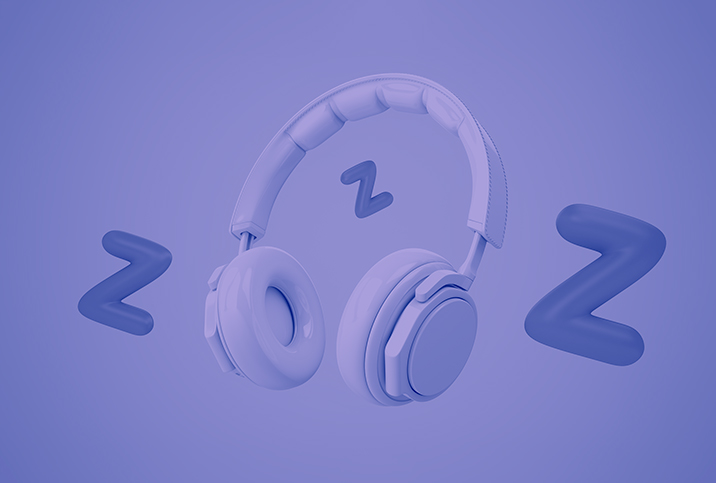A Little White Noise May Improve Your ZZZs

Getting a good night's sleep is essential for daily functioning. Recommendations for adults vary, but it's standard to aim for seven to nine hours of uninterrupted sleep. However, that perfect stretch is difficult for a lot of people.
According to the American Sleep Apnea Association (ASAA), more than 11 percent of Americans report insufficient sleep every night. An estimated 50 million to 70 million people of all ages and socioeconomic groups are affected by sleep-related issues—that's around a quarter of the U.S. population.
With demanding jobs, family responsibilities and overall daily stress, many individuals fall short when it comes to attaining meaningful rest. The first major problem, though, is falling asleep in the first place.
Pitch-perfect sleep aid
After a long day—or any day—it can be frustrating to crawl into bed and simply be unable to wind down. Feeling exhausted but still unable to sleep can lead to restless nights and moody mornings. If you find yourself falling into this vicious cycle, consider using white noise to help expedite the process. Even though it may seem counterintuitive—surely silence would be more conducive to sleep?—this can prove a successful solution.
Consider this: Even a slight sound can be alarming for someone who lives alone and could send their thoughts into a panic spiral. Or, you could simply be startled into wakefulness from the verge of sleep by a stray car horn outside. However, if background noise is used to muffle out ordinary sounds—especially when they seem magnified at night—you'll be less distracted and sleep will come quicker.
In a 2016 study published in the Journal of Caring Sciences, researchers observed a total of 62 patients in a coronary care unit and used white noise to help drown out environmental noises in an effort to gain better sleep for half of them. Though no differences in sleep quality were identified between the two groups prior to the study, afterward the group with white noise reported a significant improvement.
A simple way to experiment with this concept is to turn your television on to something soothing with the volume on the lowest setting and set the sleep timer to automatically shut off after a period of time. If this works, you may have found your ongoing solution.
There's an app for that
To take it one step further, try looking for an app designed specifically for relaxation. There are a variety of options available for your computer and phone, and most are either free or inexpensive.
Adam Beech, a yoga instructor from Phoenix, Arizona, has a tough time falling asleep without hearing something in the background and so he chooses to listen to the sound of rain on a playlist he's created. It's stored in the cloud and can be played from any device that connects to a wireless speaker. Although his partner wasn't used to listening to the sounds of nature to fall asleep, she eventually grew accustomed and now also can't sleep without it. Beech added that she finds it so soothing that she listens even when she's traveling solo.
If Beech can't connect to Bluetooth or access the app, he finds that a noisy fan works pretty well as well. If he's in a hotel room, cranking the AC unit often does the trick, as long as it has a slight rattle to it. As a last resort, zoning out to a documentary on TV with a three-hour sleep timer gets the job done, too.
If background noise is used to muffle out ordinary sounds—especially when they seem magnified at night—you'll be less distracted and sleep will come quicker.
Similarly, Sara Paige, a yoga instructor with a specialty in anatomy in Scottsdale, Arizona, has been using noise to fall asleep for as long as she can remember.
"I prefer to have a fan running on low, but sometimes I use quiet meditative music or one of a few select guided meditations," Paige said. "I have difficulty falling asleep when it's too quiet in a room, though it's not impossible for me to do so."
Luckily, her husband's sleep habits mirror hers and they find that they both enjoy deeper sleep with a fan running in the room. They always take a battery-operated fan when they go camping, even in colder weather. If the noise becomes too loud to be soothing, the noise can be dampened by throwing a shirt or pillowcase over it.
Why it works
Carpenter, a physician assistant in Scottsdale, Arizona, believes white noise or any kind of background sounds can be highly beneficial to nodding off.
One of the main reasons people can't sleep at night is an overly active mind. Whether it's a noise machine, fan or TV, an ongoing sound can distract the mind enough to slow racing thoughts.
Carpenter's preference is to select a movie she's seen before and watch it on her phone. This works well because she knows what will happen and doesn't have to pay attention to the plot or dialogue.
"Falling asleep to a movie that I'm already familiar with allows me to stop thinking about things and relax," she explained.
White noise can also be an asset for people who live in areas where there are a lot of obstructive noises in the environment, such as busy roads or nightclubs. Think also of those who work nights and need to sleep during the day—noises during working hours are much louder, including construction, roads and just the hustle-bustle of people in their workday.
Quiet tones work well for babies napping peacefully, too.
From music or meditation to movies and sound machines, there truly is something for everyone to try. If your first choice doesn't stick, don't be discouraged. Keep experimenting until you find sounds that work for you. And don't be shy to talk to your doctor about this: Sleep is one of the most under-discussed and extremely vital aspects of your overall health and well-being.


















